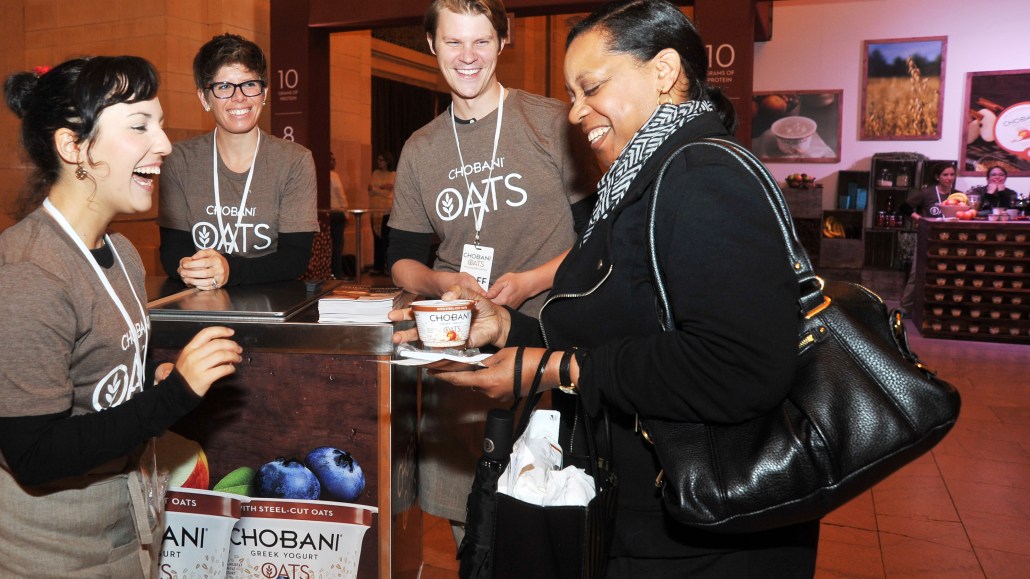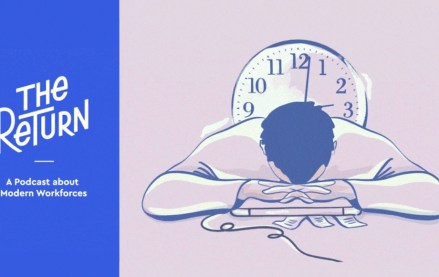
Breakfast is no longer the most important meal of the day, and most people settle for a quick (carb-heavy) muffin or bagel and a quick cup of coffee.
Chobani is going all out to change that. With its new multi-faceted campaign #stopsadbreakfast, launched to promote Chobani Oats, the Greek yogurt brand is getting in on the oatmeal game with a new breakfast medley that combines whole grain steel-cut oats with the brand’s signature fruit and yogurt flavors.
“People have breakfast fatigue, there hasn’t been any breakfast innovation in so long,” Peter McGuiness, Chobani’s CMO, told Digiday.”We’re the antidote to sad breakfasts.”
The campaign, launched in partnership with agency Droga5, kicked off yesterday with pop-up sampling booths in New York’s Grand Central Station and in Bryant Park, where commuters can stop by for some free Chobani Oats. There are also scheduled workplace takeovers in Houston, Atlanta, Chicago and Minneapolis where Chobani will restock select office refrigerators with cups of Greek Yogurt Oats later this month.
“Cho-ffeur” Pedicabs that will give free surprise rides and breakfast-on-the-go to morning commuters around major transportation hubs in Chicago, Washington D.C. and Boston.
“It’s a new product, so we want to get trial out there and get more people to try it,” said McGuiness. “At it’s essence, the campaign is all about getting more people to try it– physically, digitally and socially.”
Chobani is also getting in on the original content game with videos poking fun at sad breakfasts (burnt toast, bruised bananas, bad coffee). It is, for example, rolling out “Oats-terventions,” an original content series in which the brand intercepts unsuspecting sad breakfast sufferers, and swaps their breakfast with Chobani Oats. This content will also be shared on its social channels including Facebook, Twitter and YouTube.
It has also partnered with The Onion to produce custom satirical faux PSAs which will be hitting its digital and social channels by the end of the month.
“Content creation is very important because it’s high engagement for the company as well as the consumers,” said McGuiness. “It gives us credibility. We’re developing content because we are really passionate about and believe in our product.”
Despite the occasional misstep, Chobani’s digital marketing strategy has been strong lately. Just last week, Chobani partnered with transportation network company Lyft to provide special hand-deliveries of Chobani’s limited edition Pumpkin Spice flavor through a special “Chobani Mode” option in Lyft’s app.
This campaign too hopes to create more brand affinity — and eventually sales — for the new product. Chobani reports having handed out 7,200 samples of Chobani Oats yesterday alone and has doubled the orders for today and tomorrow, expecting to hand out more than 10,000 samples each day. Socially too, the campaign is generating buzz, with Chobani asking fans to share photos of their sad breakfasts tagged #StopSadBreakfast, and rewarding them with a complimentary cups of the product. The hashtag has generated over 2,000 mentions over the past week, according to social analytics firm Topsy.
“As a leader in the category, we’re trying to grow the category,” said McGuiness. “We’re not after short-term tactical gains. We’re trying to be above the fray on that and act like the leader.”
More in Marketing

With the rise of the chief AI officer, it’s time to examine ‘czar’ culture
Even if it’s a familiar pattern — hot new thing, new C-Suite exec to tackle said thing, a few years go by and that C-Suite position no longer exists as everyone is now doing said thing (or it was a fad that has since faded away) — does it make sense for businesses to continue to appoint new czars with every new trend?

Why Cava’s bid for brand awareness means prioritizing streaming ads
Fast-casual restaurant chain Cava has been in growth mode over the past year and is leaning into streaming ads in an effort to boost brand awareness.

A history of middle manager stress: The Return podcast, season 3, episode 1
In episode one, McKinsey partner Emily Field tells us more about why middle management is critically important to the workforce.





